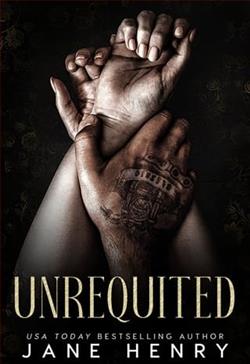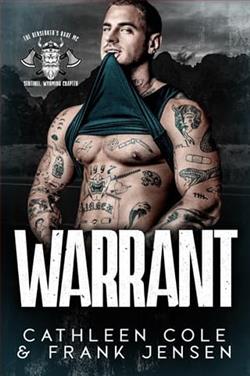Page 21 of Heartbreak Bay
I follow the accommodating deputy uphill to her small folding table. She’s got a map spread out that’s weighted down at the corners with rocks, and still rippling a little in the strong, chilly breeze. “Okay,” she says, and points to a spot on the paper. “This is your section. Grid search, north to south, then east to west, no more than three feet apart on each pass—”
“Thank you, Deputy; I know how a grid search works,” I say. “Channel?”
“We’re on seven,” she says, and hands me a walkie-talkie. It’s a brick of a thing, heavy enough to use as a baton in an emergency, and built so sturdy it would probably work if you ran over it with a truck. I turn the dial to the right channel and do a radio check. At her nod, I head uphill into the tree line.
Darkness drops a cloak on my head, and I pause to let my eyes adjust. It’s oddly warmer here, mainly because the breeze isn’t as strong and direct; I take a few breaths and flip on the flashlight to look for the marker Prester would have put in to show where he stopped his search. The fluorescent hit of the neon yellow flag jumps out at me. He didn’t get too far.
I walk to it, alert to the whisper of the woods. There are other cops out here doing their own grids, but I can’t see or hear them; I might as well be alone, as far as it feels. I love Javier, but if he laughs at meone more timeabout feeling vulnerable out in the wild ... I shake that off and pull up the marker flag. The deputy’s given me neon orange flags to use if I find any potential evidence; the number of them in the bag is damn optimistic, seems to me. But I’ve noted which way Prester had his flag pointed, and I start slowly walking that grid. I frequently refer to my compass to be sure I’m straight on the path; too easy to get turned around out here.
I pause when I spot a glint in the light and crouch to examine it. A broken beer bottle, label long tattered from being out here for years. I mark it anyway and move on.
Prester’s grid is not rich in clues. I finish north to south, start east to west, and I’m halfway through (and an hour in) before I spot something odd. I examine it, trying to figure out what it is; it’s just a shapehalf-hidden by a scramble of ferns, but it looks wrong. I carefully move the plants and take a closer look.
Smooth. Pale. Curved. Organic.
This has nothing to do with our missing woman, but this is bone. My heart starts beating faster, but I talk it down.Probably just an animal,I tell myself. That would make sense; itisthe middle of the damn woods. I know it’s risky, and the TBI boys will probably, righteously, scream about me tampering with evidence, but I don’t want to be that stupid local who fussed over a deer skull either. So I crouch down and start carefully working the dirt away from the sides.
It’s a human skull, buried in the ground chin down. Whether it was fully covered before and rain washed it visible, I can’t tell, but when I get to the brow ridge and orbital sockets, I know for a fact it’s human, and probably male, since the brow ridge is large. I stop, back off, plant an orange flag, and key my radio.
“Got something,” I report to the deputy manning the table back down the hill. “I’m going to need the scene commander up here, now.”
“Yes, Detective,” she replies crisply. “I’m sending him now. Y’all need forensics up there, too?”
“Absolutely,” I say. I think that’s the end of the conversation, but after a short pause she comes back.
“Did you find her?” She asks it tentatively, almost reverently.
“No,” I said. “Something else. No sign of our missing woman.”
She doesn’t respond this time. I wait, staring at that half-buried skull.
Who are you?I wonder who put him out here in the dirt too. And why the hell he’s so close to the drowned car in the pond. Because something—nothing logical, something deep at the base of my brain—is whispering that it can’t be a coincidence. We like things to make sense and be logical, we cops. I know this probably won’t mean a damn thing except some drunk hunter broke his leg and got eaten by the proverbial bear, but ... still.
It’s connected. I know that, even if I can’t prove it yet.
My grid quickly turns into a crime scene, and after initial questioning by the scene commander—a TBI lieutenant, white and brusque, who demands to know why I partially uncovered the skull and doesn’t much listen to the answer because asking is enough to fill in the box on his mental form—I drop back to lean against a tree and watch from a distance. Their approach is pretty clean, all things considered, and it being an old crime, not a fresh scene, they don’t have to worry about footprints. Hairs and fibers, though, they do worry about, and everybody hovering over the skull ends up with forensic paper coveralls, or they don’t make an approach at all. A tech approaches me to gather hair and fiber samples in case I’ve shed on the dirt or skull, and I’m fine with that. It’s just protocol.
What isn’t protocol is the way the scene commander throws out opinions like he’s shaking off water.Probably a drifter.Out in these woods? Unlikely. Homeless folks don’t hang around in the woods by preference, and if he were homeless, he’d have had a pack, some kind of tent, something. There’s nothing I can see anywhere nearby.Some drunk who decided to sleep it off in the wrong place. Or a suicide.
Accidentally dead people and suicides don’t generally bury their own skulls. I know the skull could have gotten separated from the body by scavengers; could have rolled here from uphill, come to that, and gotten buried in mud naturally. I wonder if I should mention it, because not one of the people on scene is looking that direction yet.
I don’t. Instead, I head up the hill.
It’s a tough climb, friable rock shattering into gravel under my feet, slick vegetation nearly sending me down again, but I manage. I arrive at the top breathing hard, sweating under my jacket, and put my hands on my hips as I slowly turn a circle. Here at the top it’s still shady but not the same nightfall it was down below, and I don’t need the flashlight to identify the grave. It’s old, but not more than a couple of years, I’djudge. Shallow, and disturbed plenty by scavengers, which explains the skull tumbling down the hill. I don’t dig into the dirt this time, just observe; I don’t have to touch a thing to see three rib bones sticking out. Tattered fabric flutters in the wind.
I solemnly plant one of my neon flags, stand up, and key the radio. “Got something up the hill,” I say. “Looks like the rest of the body.”
From where I’m standing, I can see everyone stop, turn, and look up at me.
I don’t say anything else.
The TBI agent is on a slow boil now, not because I’ve found the body but because I’ve disproven his popped-off theories. I’m told to fall back and keep going with my grid search ... although the bootheels of all those officers have left me with a mess that will make it ten times harder. I don’t argue. I slip and slide back down the hill, flick on the flashlight, and start where I stopped. There’s a lone deputy standing guard down there, roping off the area around the skull; we nod, and I keep moving. It’s another hour before I’m to the end of the pattern, and I report in what little I’ve come up with—couple more glass bottles, a plastic water bottle, and a shotgun shell casing that looks too weathered to be of much use. I head back through the trees to the table, and I’m surprised to see the sun’s already sliding toward evening. Didn’t feel that long, but when I check my watch, a wave of exhaustion hits me. I haven’t slept much in the past forty-eight, and while Icankeep going, it’s not real smart. I’ll start to miss things. My reaction time will turn to shit, which when you carry a sidearm is a real problem.
I phone myself off duty with the station and head to Pop’s warm, cozy cabin up the hill from Stillhouse Lake. I bounce my car up the steep gravel road to the flat parking area—just big enough for my dad’s truck and my car—and when I step out into the chilly evening air, Icatch the smell of the place. I breathe it deep, closing my eyes. Fresh, clean trees, and no lake scent this far up. Dad’s cooking up fish, and I have to swallow a sudden burst of saliva as I realize how damn hungry I am. When did I eat? I can’t remember anymore.
I knock, wait for his yell, and enter the side door. Javier’s dog, Boot, bounds to his feet, panting, and comes to me for his welcome petting. He’s well behaved, even in the face of the smell of food. I hug his big, muscular neck, and he gives me fond licks. “Lock your damn doors,” I tell my dad as I stand up again. He doesn’t turn around from the stove, just waves a big iron fork over his head.
“Anybody comes for me in here, I’ll stick ’em on the grill,” he says. “Filleted.”















